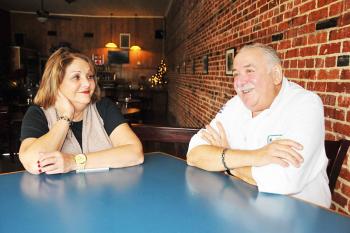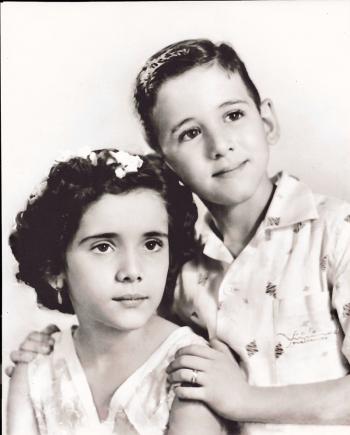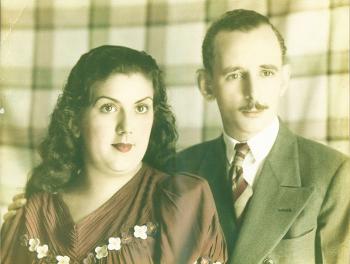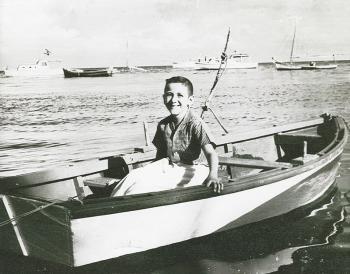
Sonia Sterling Hebert and her brother, Francisco Sterling, talk Tuesday in their family’s restaurant, Latin Corner in Morgan City, about their journey to the U.S. from Cuba and why Cubans everywhere are celebrating Fidel Castro’s death. (The Daily Review/Zachary Fitzgerald)

Sonia Sterling Hebert and Francisco Sterling are pictured together as kids. Sterling arrived in the U.S. from Cuba by himself in 1962, while Hebert came to the country a year later with their parents. (Submitted)

The Sterlings’ parents, Francisco Sterling and Maria Isasi, brought their son and daughter to the U.S. in the early 1960s to give their kids a better life than they had in communist Cuba. (Submitted)

Five-year-old Francisco Sterling sits in a boat in Varadero, Cuba. Sterling’s parents put him on a plane by himself to flee Cuba in 1962 when he was 12 years old. (Submitted)
Free from Castro at last; flight from dictator leads family to Morgan City
Death and celebration aren’t two things that usually go together. But talk to siblings Francisco Sterling and Sonia Sterling Hebert, and you’ll soon under-stand why Cuban dictator Fidel Castro’s death is cause for them to celebrate.
Sterling, 67, and Hebert, 70, both of Morgan City and natives of Cuba, felt a lot of emotions upon hearing news of Castro’s death late Friday night.
Hebert’s son called her about 10 p.m. Friday to tell her that Castro, 90, was dead. Over the years, they had heard false reports that Castro had died. But this time when Castro’s brother, Raul, confirmed the death, they knew it was true, they said.
“I got my big Cuban flag and went out at 2 o’clock in the morning and put it outside of my house,” Hebert said.
Many people, including the Sterlings’ parents, Francisco Sterling and Maria Isasi, left Cuba during Castro’s reign because they wanted a better life for their kids, Hebert said.
“My parents, they did all that because of us. And, that, I can never forget,” Sterling said.
He remembers his father saying the family would only stay in the United States about a year after the family moved to the country in the early 1960s. But both his parents would die in the U.S., his mother in 1979 and father in 2003.
“They didn’t get to see this. That’s why we’re celebrating,” Sterling said.
Cuba went through “57 years of human rights abuse,” many killings, including children, by firing squad, the destruction and separation of families along with government searches and seizures of people’s possessions under Castro’s reign of terror, they said.
“I don’t celebrate any human being’s death, but I don’t consider him a human being,” Hebert said of Castro. “He was a monster, and he was a killer. And he even killed people of his own family.”
Castro destroyed the whole country and the families that called it home, Sterling said.
The Sterling family’s restaurant, Latin Corner in Morgan City, offered a free mojito to customers Saturday to celebrate Castro’s death.
Sterling and Hebert received many calls and visits from people wishing them well.
Cubans all over are celebrating because of all the terrible things they had to go through during Castro’s rule, Sterling said.
As a young boy, Sterling saw people get shot “for nothing, for being against the government,” he said.
“Everybody was waiting for that day because he (Castro) was the root of the whole thing,” Hebert said. “Once the root is gone, the tree’s going to fall down.”
Raul Castro is “really bad, but he is not going to be even close to what his brother was,” Hebert said.
Though Raul had assumed power in 2008 due to Fidel’s declining health, Fidel was ordering Raul what to do even toward the very end of his life, Hebert said.
Sterling’s journey to the United States began in 1962 when his parents put him on a Miami-bound plane by himself as a 12-year-old, leaving his home of Matanzas, Cuba.
“I didn’t know if I was going to see my family again,” Sterling said.
Sterling was put in a foster home with five foster parents. Sterling didn’t know any English at the time, and the foster parents didn’t know any Spanish. His foster parents were really nice, but he escaped many times because he wanted to go back home, he said.
Hebert had to stay with her parents in Cuba because Castro wouldn’t let entire families leave at the same time.
In October 1962, all flights out of and into Cuba were suspended because of the Cuban Missile Crisis.
So Hebert thought she may never see her brother again.
In 1963, Hebert and her parents were able to get on a cargo ship headed to the U.S. after her mother’s godchild, who worked for the Cuban government, let them board the ship.
They had to walk 3 miles to get to the boat with her mother, who was confined to a wheelchair, Hebert said. They were only allowed one suitcase for the three of them.
“We arrived in Miami with no clothes, no money, and we didn’t know anybody,” Hebert said.
No one in 1963 Miami spoke Spanish, she said.
Hebert and her parents stayed in someone’s home for two weeks in Miami. The foster family taking care of Sterling in St. Petersburg, Florida, brought him to Miami to reunite with his sister and parents.
However, Sterling didn’t get to stay with the rest of his family until their father “had a steady job,” Hebert said.
The family eventually moved with Sterling to Albuquerque, New Mexico, in hopes that their father could get a job as a machinist.
But once the family got there, their father found out he wasn’t eligible as a non-U.S. citizen because the job was a government one.
So, for the next year, he cut grass, cleaned churches and did what-ever other work he could find to help the family to survive, Hebert said.
In 1964, the Sterlings moved to Morgan City after their father got in touch with one of his wife’s cousins who worked at McDermott Shipyard. The cousin found their dad a job at McDermott.
Everyone in the Morgan City area was “super nice” to the family, Hebert said. Cubans were the first Spanish-speaking people to arrive in Morgan City and there were only about 20 Cuban families in the areas when the Sterlings got here, Hebert said.
Sterling followed in his father’s footsteps and worked as an engineer technician at McDermott for 20 years before deciding he wanted to open his own restaurant, which he did in 2004.
“It was my dream to open this. I said, ‘you know what, I’ve been through so much in my life. I already lost every-thing. If I lose it again, I can start all over again,’” Sterling said.
Sterling always had a passion for cooking, “especially Cuban food,” he said.
“In Cuba, we had lunch at my grandma’s house. Everybody (would) get together,” Sterling said. “That’s one thing he (Castro) destroyed.”
Hebert is optimistic about where U.S.-Cuba diplomatic relations are headed with improvements over the past two years.
People are now able to send packages with medicines to Cuba, and flights leave Miami every day headed to Cuba, she said.
Hebert had to wait 16 years from the time she first left Cuba until she could return in 1979.
Sterling and Hebert traveled back to Cuba together in 1998, and Sterling brought her son, Lionel, with them, who enjoyed the experience, she said.
Hebert wants to get together a group of family members and return to Cuba and tour the entire country, Hebert said.
Sterling is glad to live in his “adoptive home” in the U.S., “but, still, I’m a Cuban,” he said.
“Deep down inside my blood, I’m a Cuban,” Sterling said. “And that’s my country. And I love it. Besides everything that’s going wrong with it, it’s my country.”
- Log in to post comments
